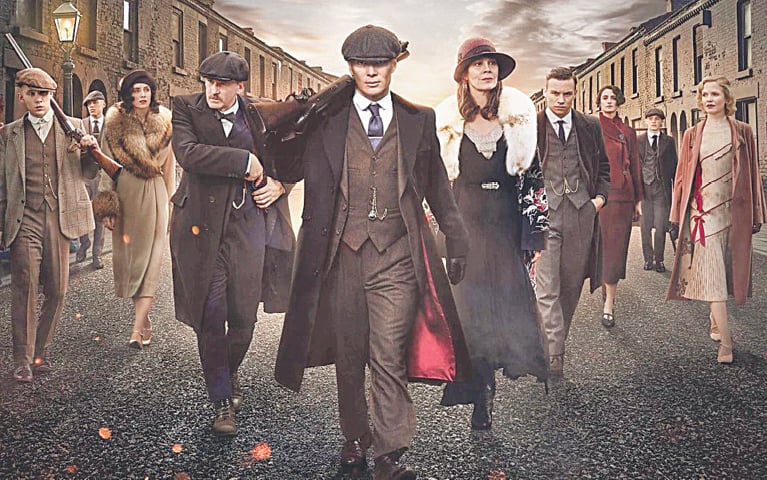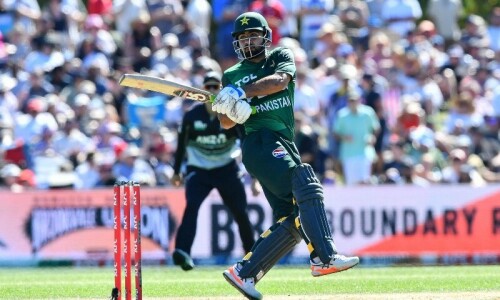
A genre-bending, beautifully cinematic gangster drama, Peaky Blinders has been a television achievement like few. The rise and fall (and rise) of the Shelby family is told with the grit and glamour of a modern classic.
Set in the slums of Small Heath, Birmingham, just after World War I, the series follows Thomas Shelby, born of Irish Traveller and Romani ancestry, and his aunt and siblings as they move their way up in post-war Britain.
PERIOD DETAILS
The appeal of the show not only lies in the spectacular acting and storytelling, but also the era’s clothing and anachronistic soundtrack. Named after the real-life gang that used their iconic peaked caps with razor blades sewn in to cut their adversaries’ eyes, the Peaky Blinders fight like soldiers dressed to the nines. All this while the music provides the pulse of the show. A mix of rock, gothic, blues, folk and more, the soundtrack has a reputation of itself.
Arthur, Tommy and John, the adult Shelby brothers at the beginning of the series, are the quintessential leadership of the Peaky Blinders. Most of these men have recently come home from the Great War to some of the worst poverty and post-traumatic stress imaginable.
The enduring appeal of the gangster drama lies not only in its spectacular acting and storytelling, but also in the era’s clothing and anachronistic soundtrack
The working-class background of the area inspires the uniform of the eponymous gang. The famous peaked flat caps, also known as the newsie cap after newsboys of the time, suggests a very industrialised urban street life. They’re also a Blinder’s most intimate weapon!

The caps are mostly matched with tweed suits, except for formal occasions, in colours of grey and black with matching overcoats. The ensemble displays power over a working-class community but also connection to that community.
Under the suits they wear band collar shirts (sometimes striped) with detachable starch collars (for a little finesse). All members also have a distinctive haircut — which became quite popular among fans of the show — a military style that shaves everything off the sides and back. The hairstyle signifies the soldier mentality of the group and ironically gives each one a unique characterisation.
An interesting period detail are the metal sleeve bands they wear on their elbows to make their shirts look fitted. The tastes of the main characters change as they enter the corridors of power and politics. Stylistically, the show is so popular that it inspired Peaky Blinders festivals and bars, where attendees and staff dress accordingly, and it also led series creator Steven Knight to start a clothing line called “Garrison Tailors”.
Since the family is Romani, we also get treated to the aesthetics of these turn-of-the-century nomads. The Romani are an ethnic nation that originates from the Rajasthan region of South Asia and has diaspora all over the world. With a lot of cultural and national diversity amongst them, they are known for their artistic and nature-dwelling lifestyle. Commonly known as “Travellers” in Britain, the Irish Travellers are the Romani that settled in Ireland and mixed with the locals.
The women of the show really shine in this style. While their urban dressing is no less sophisticated than the men’s, Romani women don floral skirts and blouses, with sublime cultural jewellery. The Traveller men mostly dress as urban working class, while some keep a more rural look.
The Romani prefer earthy tones, such as green or reddish-brown. The ladies also regularly wear scarves and coats with bohemian patterns which, along with their ornately painted wagons decorated with artefacts, signifies their free spiritedness.

The Peaky Blinders are the style icons of the show, but a couple of non-Peaky characters also stand out with their fashion choices. Alfie Solomons, the leader of a Jewish gang in London, is the slyly humorous ‘frenemy’ to Thomas Shelby. Still looking like a working-class man, Alfie cleans up well on religious days when he wears the ‘tallit’ (prayer shawl) and a black wide-brim hat common with Hasidic Jews.
He usually keeps it more casual, a shirt, pants and a variety of waistcoats. His wit is as impressive as his accessorising habit, the gold neck chains, bracelets and rings add layers to this eccentric man. The chained reading glasses and walking cane reveal vulnerability as we see him decay into a ghost man, seemingly unkillable by disease or bullets.
And then there’s Aberama Gold, a cold killer feared by his fellow Romani kin. We first see him in a maroon three-piece suit with a matching overcoat and hat, sporting a gold earring on his left. He appears as a Western outlaw, with his chilling stare just under the brim of his hat, the long blonde hair, and a unique voice.
Later, he becomes part of the Peaky Blinders, cuts his hair short, grows a moustache, and starts wearing grey suits. These men and the Shelbys pull each other’s strings in every way.
AND THEN THERE’S THE SOUNDTRACK

The theme song of the show could not have been more aptly chosen. Red Right Hand, from the Australian band Nick Cave and the Bad Seeds’ 1994 album Let Love In, is a dark tale of an ambiguous figure that brings prosperity and destruction.
The lyrics capture the effect of Thomas Shelby on the people around him and rightly paint him as a mastermind manipulator who sees no limitations in front of his goals.
The title is inspired by the John Milton poem Paradise Lost where it refers to the vengeful hand of God. Musically, the song uses a bell, organ, guitar, bass, and percussion, with beats so far apart as to pull the listener into its world. It creates a gothic Western-folk soundscape that immediately excites the audience when heard with Thomas Shelby riding in on a black horse. Becoming synonymous with the show, the song’s many covers feature throughout, eliciting different moods.
The rest of the soundtrack is no less impressive. While alternative rock is the umbrella term for it, the music ventures mostly on the gritty-bluesy and gothic side of rock. Prominent featured artists include Jack White (The White Stripes), Dan Auerbach (The Black Keys), the positively eclectic PJ Harvey and the sonically fluid Arctic Monkeys.
These musicians, and more, enhance the action, tension and sentimentality of the drama. Some of the best examples of these tracks are The Prowl (Dan Auerbach), Love Is Blindness (Jack White) To Bring You My Love (PJ Harvey), R U Mine? (Arctic Monkeys), You And Whose Army? (Radiohead) and so on. Folk rock also features during the softer scenes, such as What He Wrote (Laura Marling) and Breathless (Nick Cave and the Bad Seeds).
The show is legendary for how it moves through cinematic genres. The first two seasons are palpably Western, the third is a Hitchcockian psychological spy thriller, the fourth is a gangster war, the fifth and sixth are conspiracy political thrillers with the latter also crossing into gothic horror.
Hence, the soundtrack takes a turn toward a dark-indie aesthetic at the end. A standout track from the final season is Stone Towers by Dol Ikara, the combination of the cinematography and the music is unmissably great.
Other than the modern needle drops, the show also has songs and singing in the story. The character of Grace Shelby is introduced as the new barkeep at the local watering hole, who likes to entertain the patrons with bar and folk songs of her native Ireland.
A much sinister example of this is the singing ritual of the Billy Boys gang from Glasgow. They start singing their gang song as they approach people they are about to attack. In the London scene at Sabini’s club, as the boys walk into this early swing club circa 1922, they are surprised and annoyed by what people consider music these days.
However, it plays brilliantly in the fight scene that harmonises with the swing dance and hot jazz. The ‘organic’ music of the show, like the fashion, gives us a feeling of time, place and people as an essential ingredient to the mix.
There are few shows that seem unmissable to me and I must place Peaky Blinders on that list. This saga of 15 years, through events and people of modern history, is a treat for cinephiles. Trend-setting fashion and soul-stirring music combine to make it an unforgettable experience full of terror and style. The operatic soundtrack over this violent opus demands reverence of the marriage of film and music.
The expectation of a film moving the story forward, set during the second World War, gives us promise of more positively creative choices of visual and sonic storytelling.
Published in Dawn, ICON, August 7th, 2022















































